
BIOCHIMICA ET BIOPHYSICA ACTA-REVIEWS ON CANCER
Scope & Guideline
Elevating Understanding through Comprehensive Reviews
Introduction
Aims and Scopes
- Molecular Mechanisms of Cancer:
Investigates the fundamental molecular pathways involved in cancer development, including genetic mutations, signaling pathways, and cellular processes that contribute to tumor initiation and progression. - Therapeutic Strategies and Innovations:
Explores novel therapeutic approaches, including targeted therapies, immunotherapy, and combination treatments, aimed at improving cancer treatment outcomes. - Tumor Microenvironment:
Examines the interactions between tumor cells and their microenvironment, including the role of immune cells, extracellular matrix components, and metabolic factors in cancer progression and therapy resistance. - Biomarkers and Precision Medicine:
Focuses on the identification and validation of biomarkers for diagnosis, prognosis, and treatment response, supporting the shift toward personalized cancer therapies. - Emerging Technologies in Cancer Research:
Highlights advancements in research methodologies, such as omics technologies, artificial intelligence, and novel experimental models, that facilitate the understanding of cancer biology and treatment efficacy.
Trending and Emerging
- Immunotherapy and Immune Microenvironment:
There is a notable increase in research focused on immunotherapy, particularly the roles of immune checkpoint inhibitors and the tumor immune microenvironment, indicating a growing interest in harnessing the immune system to combat cancer. - Metabolic Reprogramming in Cancer:
Emerging studies are examining how cancer cells reprogram their metabolism to support growth and survival, leading to potential therapeutic targets that disrupt these metabolic pathways. - Role of Non-Coding RNAs:
Research on non-coding RNAs, including long non-coding RNAs and microRNAs, is gaining momentum as these molecules are recognized for their significant roles in gene regulation, tumor progression, and therapeutic resistance. - Targeting the Tumor Microenvironment:
An increasing focus on the tumor microenvironment, including the interactions between cancer cells and stromal components, reflects the recognition of its critical role in cancer progression and therapy response. - Artificial Intelligence in Cancer Research:
The integration of artificial intelligence and machine learning techniques in cancer research is emerging as a vital theme, facilitating advancements in diagnostics, treatment planning, and understanding cancer biology.
Declining or Waning
- Traditional Chemotherapy Approaches:
Research focusing solely on conventional chemotherapy regimens is waning as the field shifts towards targeted therapies and immunotherapies that offer more personalized and effective treatment options. - Single-Agent Therapies:
The exploration of single-agent therapies is decreasing, as there is a growing recognition of the need for combination strategies to overcome resistance and improve efficacy in cancer treatment. - Basic Cancer Biology without Translational Focus:
Studies that delve into cancer biology without a clear translational application are becoming less prevalent, as there is a stronger emphasis on research that directly informs clinical practice.
Similar Journals
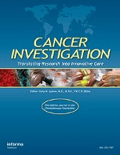
CANCER INVESTIGATION
Driving innovation in cancer studies for impactful discoveries.CANCER INVESTIGATION is a distinguished peer-reviewed journal published by Taylor & Francis Inc, dedicated to the advancing field of cancer research and oncology. With an ISSN of 0735-7907 and E-ISSN of 1532-4192, this journal has been a pivotal resource for professionals and researchers since its inception in 1983, continually contributing to the evolving landscape of cancer investigation until its convergence in 2024. CANCER INVESTIGATION boasts noteworthy rankings in 2023, including Q3 in Cancer Research and Q2 in Medicine (miscellaneous), highlighting its relevance and impact in these critical areas. The journal's commitment to disseminating innovative research and comprehensive reviews makes it an essential platform for those engaged in cancer studies and related disciplines. While currently not available as an open-access publication, CANCER INVESTIGATION remains an invaluable tool for understanding the complexities of cancer, offering insights that drive scientific advancements and improve patient outcomes.
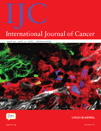
INTERNATIONAL JOURNAL OF CANCER
Exploring the frontiers of cancer science and treatment.INTERNATIONAL JOURNAL OF CANCER, published by Wiley, stands as a premier platform for the dissemination of cutting-edge research in the fields of cancer research and oncology. With an impressive impact factor reflecting its rigorous peer-review process and significant contribution to the scientific community, this journal is categorized in Q1 for both Cancer Research and Oncology as of 2023. It boasts notable rankings, being placed 38th among 404 journals in Medicine - Oncology and 32nd among 230 in Biochemistry, Genetics, and Molecular Biology - Cancer Research, positioning it within the 90th and 86th percentiles, respectively. Since its inception in 1966 and continuing to 2024, the journal has played a pivotal role in advancing our understanding of cancer biology, treatment modalities, and innovative therapeutic approaches. While it operates under a subscription model, the journal is committed to making valuable research accessible to a broader scientific audience. Researchers, professionals, and students alike will find the INTERNATIONAL JOURNAL OF CANCER an essential resource for staying abreast of the latest advancements in cancer science.
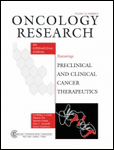
ONCOLOGY RESEARCH
Uncovering New Horizons in Cancer ScienceONCOLOGY RESEARCH, published by TECH SCIENCE PRESS, is a vital academic journal dedicated to the rapidly evolving field of oncology. With its ISSN 0965-0407 and E-ISSN 1555-3906, the journal serves as a key resource for researchers, clinicians, and academicians committed to advancing cancer research and treatment strategies. Operating without an Open Access model, ONCOLOGY RESEARCH provides high-quality, peer-reviewed articles that cover diverse topics within cancer research, medicine, and oncology, with its 2023 Scopus ranking placing it in the Q3 quartile. The journal's commitment to facilitating rigorous scientific discourse is evident in its historical breadth, with a publishing history dating back to 1992. ONCOLOGY RESEARCH is not only significant for the academic community but also plays a critical role in fostering new insights and approaches in the fight against cancer, making it a must-read for those involved in this critical area of study.
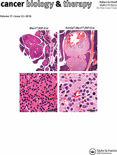
CANCER BIOLOGY & THERAPY
Advancing the frontiers of cancer research and treatment.CANCER BIOLOGY & THERAPY is a premier open-access journal published by Taylor & Francis Inc, dedicated to advancing the field of cancer research and treatment. Since its inception in 2002, the journal has evolved to provide a platform for innovative research and groundbreaking findings, addressing critical aspects of cancer biology, pharmacology, and molecular medicine. With an impressive impact factor and recognition as a Q2 journal in vital categories such as Cancer Research, Oncology, and Pharmacology, it holds significant standing in Scopus rankings, reflecting its influence and commitment to disseminating high-quality research. Offering researchers, professionals, and students a wealth of knowledge, CANCER BIOLOGY & THERAPY stands at the forefront of the fight against cancer, presenting the latest developments and therapeutic strategies vital for improving patient outcomes. Accessible to all since 2022, this journal is a must-read for anyone involved in the multifaceted arena of cancer research and treatment.
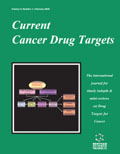
CURRENT CANCER DRUG TARGETS
Innovating drug discovery at the forefront of cancer research.CURRENT CANCER DRUG TARGETS is a prominent academic journal published by Bentham Science Publishers Ltd, focusing on the critical intersection of cancer research and innovative drug development. Since its inception in 2001, this journal has offered a platform for the dissemination of cutting-edge research aimed at advancing targeted cancer therapies, contributing significantly to the fields of Cancer Research, Drug Discovery, Oncology, and Pharmacology. With a respectable impact factor and consistent ranking in its respective categories, including Q2 in Drug Discovery and Pharmacology, it positions itself as an invaluable resource for researchers, clinicians, and students alike. CURRENT CANCER DRUG TARGETS is dedicated to enhancing our understanding of novel therapeutic targets and methods, thereby fostering a collaborative environment for knowledge exchange in the ever-evolving landscape of cancer treatment.
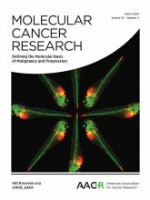
MOLECULAR CANCER RESEARCH
Elevating Understanding of Cancer at the Molecular LevelMOLECULAR CANCER RESEARCH, published by the American Association for Cancer Research, stands as a pivotal journal in the fields of cancer research, molecular biology, and oncology. With an impressive impact factor and recognized as a Q1 journal in its respective categories for 2023, it serves as an essential resource for researchers, professionals, and students aimed at advancing our understanding of cancer mechanisms and therapies. The journal, identified by the ISSN 1541-7786 and E-ISSN 1557-3125, provides a platform for cutting-edge research and clinical applications, emphasizing innovation and collaboration within the scientific community. With its focus on high-quality, peer-reviewed articles, MOLECULAR CANCER RESEARCH is vital for anyone looking to stay abreast of significant advancements in cancer biology and treatment strategies. For more details and to access the journal's content, please visit the publisher's link.
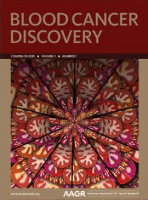
Blood Cancer Discovery
Exploring Innovations in Oncology and BeyondBlood Cancer Discovery is a premier academic journal published by the American Association for Cancer Research, dedicated to advancing the understanding of hematologic malignancies through cutting-edge research in the fields of oncology, biochemistry, and molecular biology. With an impressive impact factor and recognition as a Q1 journal across multiple disciplines, including cancer research and hematology, Blood Cancer Discovery serves as an essential platform for scholars and practitioners alike, facilitating impactful discourse and dissemination of pioneering findings. This open-access journal, established within the vibrant academic landscape of the United States, aims to bridge gaps in research and foster collaborations to ultimately enhance patient outcomes. Its Scopus rankings demonstrate its vital role in the critical advancement of cancer research and therapeutic development. By inviting contributions from a diverse range of disciplines, Blood Cancer Discovery is poised to drive innovation and inspire future advancements in understanding blood cancers.

SEMINARS IN CANCER BIOLOGY
Shaping the future of cancer treatment.SEMINARS IN CANCER BIOLOGY is a leading journal dedicated to the dissemination of groundbreaking research in the field of cancer biology. Published by Academic Press Ltd - Elsevier Science Ltd, this esteemed journal plays a pivotal role in the academic community, boasting a prestigious impact factor and ranking within the Q1 category in Cancer Research for 2023. With an exceptional Scopus rank of #11 out of 230 in the realms of Biochemistry, Genetics, and Molecular Biology, it holds a significance that underscores its influence in advancing the understanding of cancer mechanisms and therapies. Established in 1990, the journal fosters a comprehensive platform for sharing high-quality and innovative research, critical reviews, and expert opinions aimed at professionals and researchers in the field. While not an open-access journal, it provides valuable insights that enhance the collective knowledge essential for the fight against cancer. For researchers, clinicians, and students, SEMINARS IN CANCER BIOLOGY is a crucial resource, paving the way for new discoveries and innovations in cancer treatment and prevention.
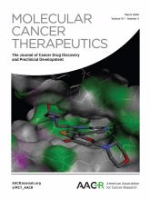
MOLECULAR CANCER THERAPEUTICS
Advancing cancer therapy through molecular insights.MOLECULAR CANCER THERAPEUTICS, published by the American Association for Cancer Research, is a premier journal dedicated to advancing the field of cancer research and therapy since 2001. With a notable impact factor reflecting its high-quality content, this journal stands out in the Q1 category for both Cancer Research and Oncology as of 2023. Researchers, clinicians, and students interested in innovative treatment strategies and molecular mechanisms can find valuable insights within its pages, bolstered by a rigorous peer-review process and a global perspective on cancer therapeutic developments. Although the journal operates under a subscription model, it provides comprehensive access to cutting-edge studies and reviews that drive forward the understanding of cancer biology and treatment modalities. The journal's impressive Scopus rankings further validate its influence within both oncology and the broader cancer research community, making it an indispensable resource for anyone committed to combating cancer through science.
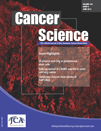
CANCER SCIENCE
Connecting researchers and clinicians to transform cancer care.Cancer Science, an esteemed journal published by Wiley, stands at the forefront of oncology research, boasting an impressive impact factor and a classification in the Q1 category for its contributions in Cancer Research, Medicine, and Oncology as of 2023. Since its inception in 2003 and transitioning to an Open Access model in 2014, the journal has facilitated global dissemination of critical research findings, ensuring that vital information remains accessible to researchers, clinicians, and students alike. With its comprehensive scope covering cutting-edge discoveries in cancer biochemistry, genetics, and molecular biology, Cancer Science is recognized for its rigorous peer-review process and significant contributions to advancing our understanding of cancer. The journal, located at 111 River St, Hoboken, NJ, is an essential resource for anyone dedicated to improving treatment outcomes and pushing the boundaries of cancer research.